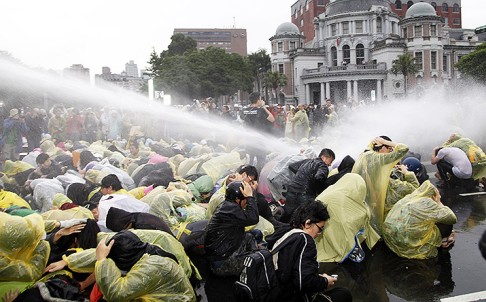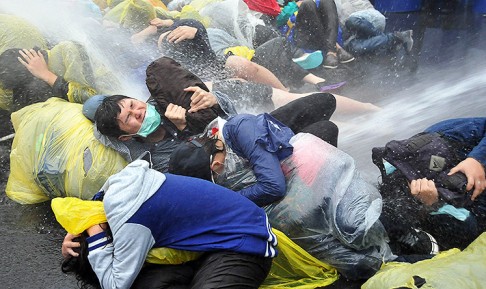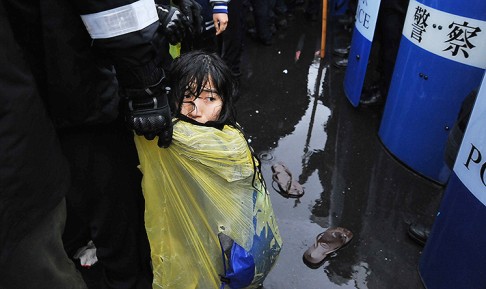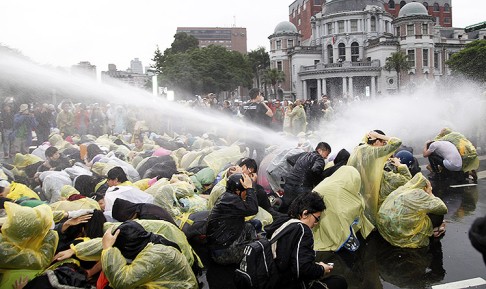Taiwan uses water cannon to disperse anti-nuclear protesters
PUBLISHED : Monday, 28 April, 2014, 6:23pm
UPDATED : Monday, 28 April, 2014, 6:40pm
Agence France-Presse in Taipei

Police fire water cannon at protesters squatting on the ground outside Taipei railway station. Photo: AFP
Taiwan police on Monday used water cannon to dislodge hundreds of demonstrators blocking a main road in the capital to demand the scrapping of a controversial nuclear power plant.
An estimated 28,500 anti-nuclear demonstrators had blockaded one of Taipei’s busiest streets on Sunday, forcing the ruling Kuomintang party to yield and halt construction work at the nearly completed plant.

Riot police use water cannon to evict anti-nuclear protesters from a busy street in Taipei. Photo: EPA
The concession prompted many demonstrators to leave but hundreds remained, causing police to use water cannon to disperse them on Monday morning.
Claiming they were attacked, club-waving riot police chased some protesters. Police also carried away some sit-in demonstrators lying on the ground.
More than 40 people were slightly injured in the clashes, the government said.
Taipei Mayor Hau Lung-bin had hinted at tough measures during a press conference Sunday night when he denounced the sit-in for disrupting the lives of ordinary people.
“The demonstrators should protest against the government rather than Taipei citizens. I may take any measures needed to ensure traffic can return to normal on Monday,” Hau said.
The new power station 40 kilometres from Taipei would be the island’s fourth nuclear plant. Opponents say it would be unsafe in an earthquake-prone island.
The plant has two reactors, one of which is 98 per cent completed.

Police remove a protester from outside Taipei Railway Station during an anti-nuclear demonstration. Photo: AFP
A Kuomintang spokesman announced Sunday there would be no further work on this reactor. After safety checks, it would be sealed.
“Construction of reactor two will be terminated,” the spokesman said. “In the future, any such commercial operation will be decided by a referendum.”
The government has already offered to hold a referendum on the future of the power plant, but opponents say the vote’s proposed terms would be too restrictive.
Protest organisers said they would keep watching to see if the government fulfils its promises.
Premier Jiang Yi-hua defended the government decision to stop work but not to scrap the plant.
“In this way, we would leave an option open to our next generation when choosing energy [sources],” Jiang told a press conference Monday.
He said Taiwan could not afford another shock similar to 2000 when the then-government of the Democratic Progressive Party (DPP) announced it was scrapping the plant.

Police fire water cannon at protesters squatting on the ground outside Taipei railway station. Photo: AFP
The announcement plunged politics and the stock market into chaos for months. The supreme court later ruled against the government decision.
The power station, whose two reactors would have a combined capacity of 2,700 megawatts, has been for decades been one of Taiwan’s most contentious projects.
Construction began in 1999 but intense political wrangling has repeatedly delayed work. It has already cost around NT$300 billion (US$10 billion).
Concern about Taiwan’s nuclear power stations has been mounting since 2011, when Japan’s Fukushima nuclear plant was hit by a tsunami which knocked out power to its cooling systems and sent reactors into meltdown.
Like Japan, Taiwan is regularly hit by earthquakes. In September 1999 a 7.6-magnitude quake killed around 2,400 people in the island’s deadliest natural disaster in recent history.
Taiwan’s three existing nuclear power plants supply about 20 per cent of the nation’s electricity.
The fourth plant is almost complete and was originally due to come online next year, according to its operator the state-owned Taiwan Power Company (Taipower).
The main opposition DPP opposes the facility on safety grounds, while the Kuomintang says the island will run short of power unless it goes ahead.
The government’s decision to stop work is another blow to the struggling Taipower which has accumulated more than NT$200 billion in deficits.
